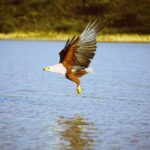African fish eagles are large birds of prey that primarily feed on fish, which they catch by swooping down from a perch and snatching their prey from the water with their large, clawed talons. However, they are also known to feed on a variety of other animals, including frogs.
The Diet of African Fish Eagles
According to studies, frogs make up a small but significant portion of the African fish eagle’s diet. A study of their diet in the Okavango Delta found that frogs accounted for 2.5% of the total biomass consumed by the eagles. Another study in Lake Naivasha, Kenya, found that frogs made up 5.2% of the total number of prey items consumed by the eagles.
These studies also found that the eagles primarily feed on frogs during the wet season, when the abundance of frogs in their habitat is highest. This suggests that the eagles are opportunistic predators, taking advantage of the increased availability of frogs during this time of year.
In addition to frogs, African fish eagles are known to feed on a wide variety of other animals, including:
- Fish
- Birds
- Mammals
- Reptiles
- Insects
Their diet can vary significantly depending on the location and time of year, as they adapt to take advantage of the available food sources in their environment.
Factors Affecting the Consumption of Frogs
Image source: African fish eagle above water by Mehmet Karatay
The consumption of frogs by African fish eagles can be influenced by several factors, including:
-
Habitat and Ecosystem: The availability of frogs in the eagle’s habitat can greatly impact their consumption of this prey. In areas with abundant frog populations, such as wetlands and lakes, the eagles may be more likely to include frogs in their diet.
-
Seasonal Variations: As mentioned earlier, the eagles tend to feed more on frogs during the wet season when frog populations are at their peak. This suggests that the eagles are adaptable predators, adjusting their hunting strategies to take advantage of seasonal changes in prey availability.
-
Competition and Prey Availability: The presence of other predators in the ecosystem can also influence the eagles’ feeding habits. If there is intense competition for fish or other primary prey, the eagles may be more likely to supplement their diet with frogs or other secondary prey.
-
Hunting Strategies: The African fish eagle’s hunting techniques, such as their ability to spot and capture frogs from a perch or in flight, can also play a role in their consumption of this prey.
Importance of Frogs in the Eagle’s Diet
While frogs may not be the primary component of the African fish eagle’s diet, their inclusion in the eagle’s diet can have important ecological implications. Frogs can serve as a valuable source of nutrients and energy for the eagles, especially during times of the year when their primary prey may be less abundant.
Additionally, the consumption of frogs by the eagles can help to regulate frog populations and maintain the balance of the ecosystem. As predators, the eagles play a crucial role in controlling the populations of their prey, which can have cascading effects on the overall health and biodiversity of the ecosystem.
Conclusion
In conclusion, while the African fish eagle’s primary prey is fish, these birds of prey are also known to feed on frogs, particularly during the wet season when frog populations are at their highest. The consumption of frogs by the eagles can be influenced by various factors, such as habitat, seasonal variations, competition, and hunting strategies. Understanding the role of frogs in the African fish eagle’s diet is important for the conservation and management of these majestic birds and the ecosystems they inhabit.
References:
- Wildlife of Kenya: African Fish Eagle
- Molema, E., & Van der Walt, S. (2006). Diet of the African fish eagle (Haliaeetus vocifer) in the Okavango Delta, Botswana. Ostrich, 77(1-2), 29-34.
- Kruuk, H., & Hart, J. A. (1982). The diet of the African fish eagle (Haliaeetus vocifer) in Lake Naivasha, Kenya. Ibis, 124(2), 203-210.

